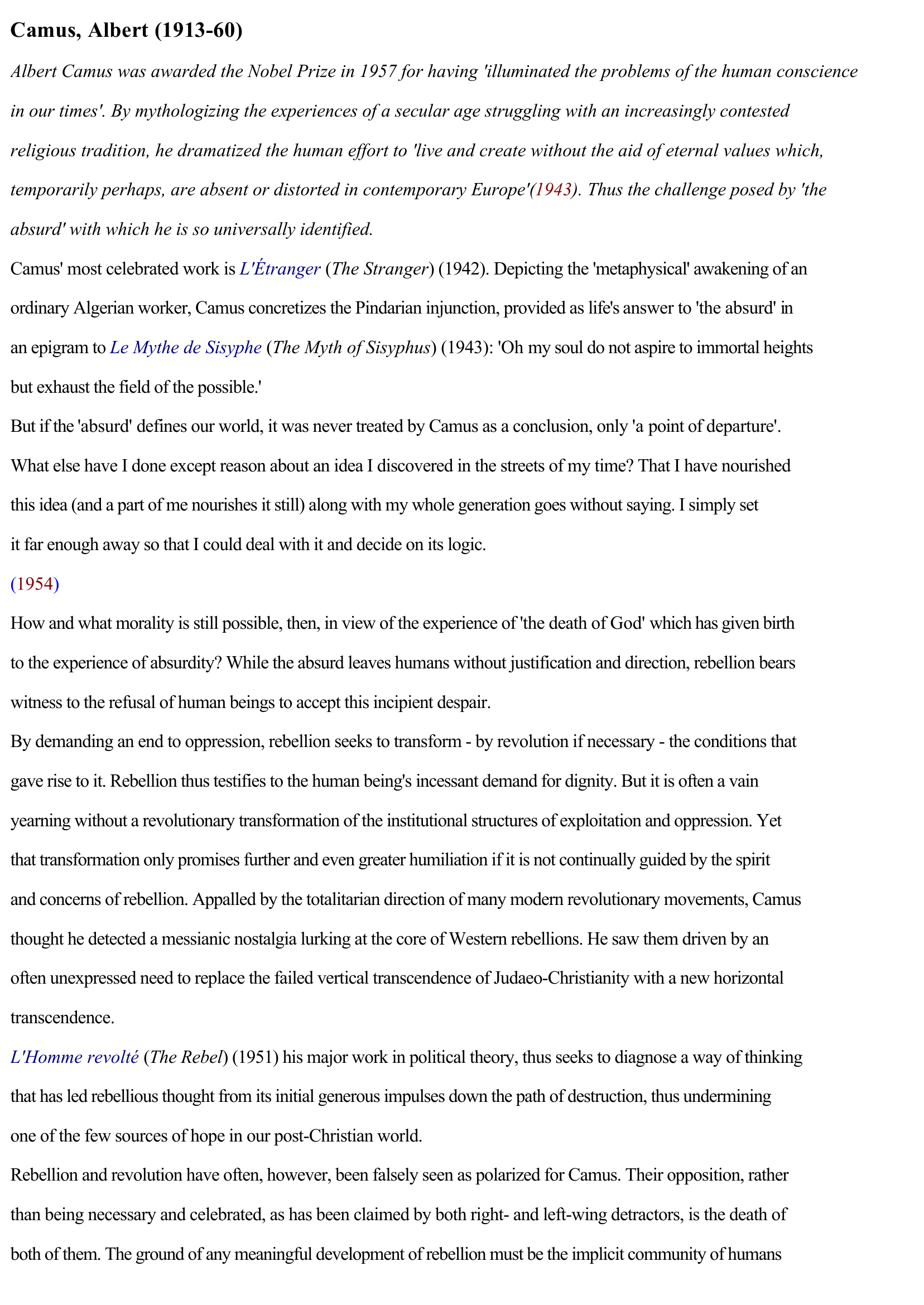Camus, Albert
Extrait du document
«
Camus, Albert (1913-60)
Albert Camus was awarded the Nobel Prize in 1957 for having 'illuminated the problems of the human conscience
in our times'.
By mythologizing the experiences of a secular age struggling with an increasingly contested
religious tradition, he dramatized the human effort to 'live and create without the aid of eternal values which,
temporarily perhaps, are absent or distorted in contemporary Europe'(1943).
Thus the challenge posed by 'the
absurd' with which he is so universally identified.
Camus' most celebrated work is L'Étranger (The Stranger) (1942).
Depicting the 'metaphysical' awakening of an
ordinary Algerian worker, Camus concretizes the Pindarian injunction, provided as life's answer to 'the absurd' in
an epigram to Le Mythe de Sisyphe (The Myth of Sisyphus) (1943): 'Oh my soul do not aspire to immortal heights
but exhaust the field of the possible.'
But if the 'absurd' defines our world, it was never treated by Camus as a conclusion, only 'a point of departure'.
What else have I done except reason about an idea I discovered in the streets of my time? That I have nourished
this idea (and a part of me nourishes it still) along with my whole generation goes without saying.
I simply set
it far enough away so that I could deal with it and decide on its logic.
(1954)
How and what morality is still possible, then, in view of the experience of 'the death of God' which has given birth
to the experience of absurdity? While the absurd leaves humans without justification and direction, rebellion bears
witness to the refusal of human beings to accept this incipient despair.
By demanding an end to oppression, rebellion seeks to transform - by revolution if necessary - the conditions that
gave rise to it.
Rebellion thus testifies to the human being's incessant demand for dignity.
But it is often a vain
yearning without a revolutionary transformation of the institutional structures of exploitation and oppression.
Yet
that transformation only promises further and even greater humiliation if it is not continually guided by the spirit
and concerns of rebellion.
Appalled by the totalitarian direction of many modern revolutionary movements, Camus
thought he detected a messianic nostalgia lurking at the core of Western rebellions.
He saw them driven by an
often unexpressed need to replace the failed vertical transcendence of Judaeo-Christianity with a new horizontal
transcendence.
L'Homme revolté (The Rebel) (1951) his major work in political theory, thus seeks to diagnose a way of thinking
that has led rebellious thought from its initial generous impulses down the path of destruction, thus undermining
one of the few sources of hope in our post-Christian world.
Rebellion and revolution have often, however, been falsely seen as polarized for Camus.
Their opposition, rather
than being necessary and celebrated, as has been claimed by both right- and left-wing detractors, is the death of
both of them.
The ground of any meaningful development of rebellion must be the implicit community of humans.
»
↓↓↓ APERÇU DU DOCUMENT ↓↓↓
Liens utiles
- Il faut imaginer Sisyphe heureux -Albert Camus (1913-1960)
- Enthousiasmé par une de ses premières lectures, Albert Camus écrit : « Nanti d'une étrange et neuve liberté, j'avançais hésitant, sur une terre inconnue. Je venais d'apprendre que les livres ne versaient pas seulement l'oubli et la distraction. » En appu
- « L'art vit de contraintes et meurt de liberté » (Albert Camus, Le discours de Suède) ?
- Pour Camus, l’absurde est le sentiment qui « naît de cette confrontation entre l’appel humain et le silence déraisonnable du monde.»
- Camus,le mythe de Sisyphe

































